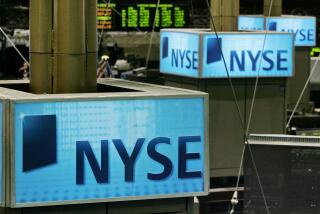CRISIS IN THE KREMLIN : Trading Action Around World Holds Steady : Markets: The Dow Jones industrial average climbs 15.66. Tokyo opens today with a gain, despite shooting in Russia.
- Share via
NEW YORK — A nervous calm pervaded world stock and commodities markets on Tuesday and in early trading today as investors worried that the financial fallout from events in the Soviet Union is far from over.
Tuesday’s muted market action resembled the stillness in the eye of a hurricane. Neither the length of the lull--nor the direction that markets will take once traders start to move them again--can be predicted, they said.
U.S. stocks staged a mild comeback after Monday’s sharp selloff, mirroring activity in major stock markets around the world. Oil prices bounced around Tuesday but closed with little change.
The Dow Jones industrial average climbed 15.66 points--less than a quarter of its Monday loss of almost 70 points--to close at 2,913.69.
The New York Stock Exchange closed before the reports of automatic weapons fire in the vicinity of the Russian Federation headquarters that was sheltering resistance leader and Russian President Boris N. Yeltsin.
But even the start of the shooting failed to halt the Japanese market’s continuing recovery today. In early afternoon trading in Tokyo today, the Nikkei index was up 576.06 points to 22,263.12, after gaining 230.30 points on Tuesday.
Other Asian markets were having a tougher time dealing with the latest news out of Moscow, however. In late-morning trading today, the Hong Kong and Singapore markets showed small losses.
On Tuesday, Germany’s DAX stock index climbed 1.9% after plunging 9.4% on Monday. London’s Financial Times-Stock Exchange 100-share average gained 14 points to close at 2,554.5.
“I don’t think (Tuesday’s rebound) has any great significance,” added Michael Metz, chief market strategist for Oppenheimer & Co. in New York. “The restrained nature of the bounce indicates you have a highly nervous investment population with very low levels of conviction of how this will play out.”
“You just can’t develop an intelligent investment hypothesis until we get more resolution of the Soviet situation,” said Robert L. Kahan, trading chief at Montgomery Securities in San Francisco.
Many traders echoed Kahan’s view that the market’s direction in the days and weeks ahead will depend on events in the Soviet Union. “If you had a civil war, or even a Tian An Men Square-type situation, you’d have a market that’s several hundred points lower,” predicted Thomas F. Ryan Jr., managing director for trading at Kidder, Peabody & Co.
Even in the absence of major upheaval, Ryan believes that Gorbachev’s replacement by hard-liners, if it stands, will have a negative impact on most stocks.
“Certainly, the high (price-to-earnings) multiples we’ve seen in recent months have been based on the assumption of peace reigning,” Ryan said. “I expect multiples will contract, given the high level of geopolitical uncertainty.”
The Soviet situation isn’t the only thing weighing heavily on stocks. Metz argued that a bearish scenario is bolstered by “creeping uncertainty about the vigor and timing of the economic recovery . . . in marked contrast to near-unanimous optimism four or five weeks ago.”
Even bulls acknowledged that the Soviet crisis could hurt the nascent economic recovery.
“I think we’re already seeing a postponement of the recovery being discounted in groups like the airlines and the autos,” said David Dreman of Dreman Value Management in New York.
But, he added, “the talk of a Cold War is outdated. . . . And we now know that the Soviet economy is a lot weaker than we ever thought it was. Unless someone presses a button, we’re not in danger.”
Dreman argued that the Soviet crisis is fundamentally different from Iraq’s invasion of Kuwait. “With Iraq sitting near Saudi Arabian oil fields, that really threatened world oil supplies,” he said.
Indeed, although oil prices jumped about $1 a barrel in most markets Monday--the biggest jump since the invasion of Kuwait--the increase was far more muted than the double-digit increases during the Iraq crisis.
On Tuesday, prices at the New York Mercantile Exchange swung wildly before light, sweet crude oil for September delivery settled at $22.27 per barrel, down 20 cents.
“It’s an extremely up-and-down market that trades on every report from Moscow,” said Thomas Blakeslee, associate director of Pegasus Econometric Group Inc., a Hoboken, N.J., commodities firm.
Oil prices climbed on reports that Soviet tanks were moving near Yeltsin’s headquarters but retreated as reports spread that some leaders of the coup were stepping down because of illness.
A Waiting Game
World stock markets gained slightly on Tuesday, but caution prevailed . . .
Mon. Tues. Tues. Market/index change change close Britain/FTSE-100 -80.50 +14.00 2,554.50 Germany/DAX -155.40 +29.00 1,526.93 Hong Kong/Hang Seng -340.53 +126.00 3,848.00 Japan/Nikkei -1,357.61 +230.30 21,687.06 Mexico/Bolsa -59.00 +16.72 1,128.70 U.S./Dow industrials -69.99 +15.66 2,913.69 U.S./NASDAQ composite -14.83 +4.41 502.05
. . . and gold, bonds and the dollar were in a holding pattern
Fri. Mon. Tues. Investment close close close 3-month T-bill 5.24% 5.10% (D) 5.11% (U) 30-year T-bond 8.08% 8.11% (U) 8.09% (D) Gold (Comex) $358.00 $358.60 (U) $355.90 (D) Silver (Comex) $3.99 $4.00 (U) $3.94 (D) Dollar vs. German Mark 1.764 1.824 (U) 1.798 (D) Oil (N.Y. Merc) $21.30 $22.47 (U) $22.27 (D)
(U) = up
(D) = down
More to Read
Inside the business of entertainment
The Wide Shot brings you news, analysis and insights on everything from streaming wars to production — and what it all means for the future.
You may occasionally receive promotional content from the Los Angeles Times.










